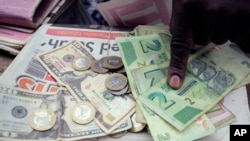Zimbabwe's central bank says it has begun circulating lower-denomination bank notes and coins, in an effort to help end severe shortages of cash and boost the new Zimbabwean currency. But many have doubts the new money by itself will improve the country's struggling economy.
By close of business Monday, most banks in Harare did not have their allocations of the new money. The Reserve Bank of Zimbabwe said it would comment once it has ensured that deliveries has been made to all banks.
Harare resident Kudakwashe Muchena is one of those tired of the cash shortages that have made life difficult for Zimbabweans over the past two years.
He thinks the government needs to do more to boost confidence in the domestic currency, known as the bond note, after a decade of using U.S. dollars and South African rand.
"As a country Zimbabwe needs its own currency which can be used to transact locally and internationally, but I think there has been very little in terms of conscientizing the users of the currency in terms of building trust and understanding the need of a local currency," said Muchena.
Zimbabwe abandoned its own currency in 2008 due to extreme hyperinflation. The new currency faces an uphill climb, as it does not trade beyond the country's borders and has lost value since being introduced in June.
Nevertheless, Harare resident Larry Kwirirayi hopes the new currency succeeds.
"In principle of course it's a good idea to have our own currency but as always with many things in Zimbabwe, it will come down to policy and consistency and that sort of thing. Especially around monetary and fiscal policy; and also coming up with a budget. What is the budget going to say, they are many questions around it because the currency will have to be supported by production and that's where the big thing is; the success or lack of success of it is underpinned by the success outside the currency itself," he said.
Zimbabwe's economy has struggled for two decades, amid political turmoil and government policies widely seen as unfriendly to farm production and foreign investment.
Clinton Musonza, an economist at the Labor and Economic Development Research Institute of Zimbabwe, said the country's cash shortages are far from being over.
"The coming in of new notes is not going to end all the cash problems in Zimbabwe per se. You have to understand that the challenges that Zimbabwe is facing are emanating from the production side. So if as long as we are not producing enough we are going to be in this kind of situation for long," said Musonza.
Musonza said lower-denomination bond notes will improve the availability of cash but notes that the government would prefer to see Zimbabwe become what he calls "cash-light."
Since the cash shortages started, the central bank has encouraged Zimbabweans to conduct transactions electronically. But, many businesses still insist on hard money in exchange for goods and services.




